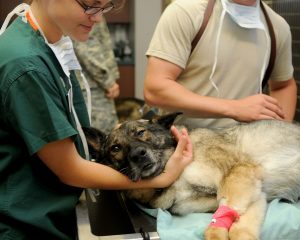Also classified as a medical profession, according to the veterinarian job description, an individual occupying such a position is in charge of protecting the health and well-being of animals. A veterinarian performs several tasks from diagnosing to controlling animal diseases and offering medical services to injured and sick animals. Other work responsibilities include offering different pieces of advice to the owners’ animals regarding the care of livestock, pets or animals in the zoo.
What Does a Veterinarian Do?
A veterinarian’s role is incredibly important for the animals that he or she treats. A veterinarian’s skills are very complex, and they include diagnosing and treating diseases as well as dysfunctions of animals. The veterinarian job description also involves clinical as well as applied research on both human and animal health problems. A veterinarian works in a very stressful environment, having to perform surgeries and deal with high priority cases and emergencies.
If you are thinking about becoming a vet, you will need to make sure that you fit the veterinarian job description and that you can handle the job requirements. It is vital to have an impressive resume that covers your work experience and your abilities and skills.

Veterinarian Job Description for Resume – Responsibilities
According to industry, level of experience and working area, veterinarians have different responsibilities. The most common duties are listed below:
- Offer the correct diagnosis to different animal health problems;
- Medicate sick animals;
- Treat and dress wounds;
- Set fractures;
- Advise owners about animal behavior, breeding, feeding, common illnesses and dangers;
- Vaccinate against diseases;
- Perform surgery;
- Conduct clinical research;
- Euthanize animals when necessary;
- Professionally use medical equipment (from surgical instruments to diagnostic equipment) and complex laboratory equipment;
- Preventing and treating different human health problems that were caused by animals;
- Research and learn new medical techniques and advances;
- Knowledge in food safety and inspection.
Veterinarian Required Skills
As the veterinarian job description outlines, besides academic competencies these professionals must also have a set of soft skills to help them become successful in the field:
- Has to be compassionate when working with animals and interacting with their owners;
- High communication skills, being able to discuss, recommend, instruct and explain treatment options and medical steps that need to be taken in order to ensure the well-being of animals;
- Decision-making skills, especially when it comes to treating wounds, injuries or illnesses of any kind;
- Manual dexterity necessary for performing different work tasks from surgeries to treating injuries;
- Problem-solving skills to correctly assess what needs to be done in different situations;
- Excellent diagnostic skills;
- Impressive surgical skills;
- Academic competencies;
- Keeping informed of new medical and scientific developments;
- Interpersonal skills (when dealing with owners);
- Business skills (to handle all work related issues from handling equipment to different medical items and products);
- High observational skills;
- Good physical health and endurance (for night shifts or surgeries that last hours);
- High ethical standards;
- Critical thinking (especially when it comes to finding alternative solutions to different work related issues);
- Soft skills and active listening when dealing with owners;
- Active learning and understanding the implications of acquiring new information in this field;
- Time management skills;
- Attention to detail.
How to Become a Veterinarian
Becoming a veterinarian takes years of resident training, practice and it also means acquiring knowledge in different fields such as biology, medicine and dentistry, mathematics, chemistry, psychology, computer and electronics and knowledge of administrative procedures. Apart from the functional category, a veterinarian has to use his or her emotional side when dealing with animals and their owners.
Education and Training Requirements
The training period has a lot of requirements that include research (both applied and clinical), knowledge in different fields (as mentioned in the paragraph above) and a familiarity with the job duties. Empathy, social skills, knowledge in the medical field as well as other fields, problem-solving and critical thinking, as well as decision making, are among the most important skills that one acquires as a veterinarian.
There are specific education requirements that a veterinarian has to complete. Every veterinarian has to complete a four-year Doctor of Medicine program also known as DMV, apart from the undergraduate school. A veterinarian also has to obtain licensure in order to practice in this field. The requirements are strict and based on the level of difficulty of this job.
Work Experience
Competent, professional veterinarians have to deal with a very competitive world because the veterinarian position is a demanded medical profession that has strict rules when it comes to the competencies, abilities, and skills of the candidate. A resume will increase the chances of getting called for an interview.
Knowing the veterinarian job description can help you realize if you are qualified for the position or not. A well-written resume can draw the employer’s attention even if you have no previous work experience, but you finished your residency years nevertheless. There are some entry-level positions available such as veterinarian assistants or junior veterinarians or nurses as well as mid-career positions, allowing you the opportunity to grow and be promoted in this specific field.
Career Prospects
There are several career paths for veterinarians, depending on one’s specialization and level of expertise. Some may choose to work in the private sector while others will prefer the public practice. Some veterinarians decide to become military veterinarians while others will work in universities and research labs. There are also many veterinarians who are interested in saving and taking care of wildlife.
Conclusion
The veterinarian job description includes the daily responsibilities as well as other abilities and skills that are needed for this job. Becoming a successful veterinarian depends upon one’s academic accomplishments, soft skills, patience and dedication in treating and curing animals.
